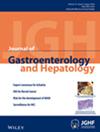Short-Term Impact of Radiofrequency Ablation on Esophageal Functional Quality of Life in Patients With Barrett's Neoplasia
Abstract
Background and Aim
Endoscopic treatment is accepted as mainstream therapy to treat dysplastic Barrett's esophagus (BO) or early esophageal adenocarcinoma (OAC) to prevent disease progression. Radiofrequency ablation (RFA) is widely used for treating flat, noncancerous Barrett's mucosa but may cause significant short-term pain and dysphagia. This study aimed to assess the short-term impact of RFA on esophageal functional quality of life (QOL), compared to surveillance endoscopy.
Methods
This prospective, observational study was conducted at a tertiary hospital in Brisbane, Australia, and enrolled consecutive patients undergoing surveillance or RFA for BO between June 2020 and March 2023. Participants completed the European Organisation for Research and Treatment of Cancer's esophageal symptom questionnaire (EORTC-QLQ-OES18) immediately before and 1 week after each procedure. Tweedie models in a General Estimating Equation framework were used to account for nonnormally distributed data.
Results
A total of 533 procedures were performed on 136 patients, with 451 included in the analysis. Of these, 302 were surveillance, and 149 were RFA procedures. Patients' median age was 65, and 83% were male. At follow-up, RFA patients reported significantly worse QOL compared to surveillance patients, particularly in dysphagia (25.1 vs. 9.5), eating difficulties (26.3 vs. 12.5), and pain (23.0 vs. 9.5), all with p < 0.001. No differences were found in dry mouth or speech issues.
Conclusion
RFA treatment for dysplastic BO can have a substantial short-term negative impact on QOL, especially concerning dysphagia, eating, and pain and difficulties swallowing saliva, highlighting the need for thorough patient counseling before treatment.

 求助内容:
求助内容: 应助结果提醒方式:
应助结果提醒方式:


